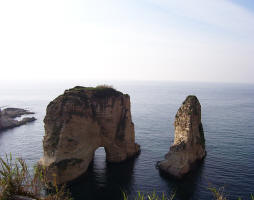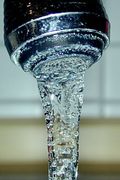 Drinking water distribution in the Agadir Region (Wilaya)
Drinking water distribution in the Agadir Region (Wilaya)
The programme for the Distribution of Drinking Water to Rural Populations (PAGER) was initiated in 1995. Implemented by the Directorate General for Water, with the support of CTB-BTC, the project aims to provide drinking water on a sustainable basis to around 25 000 people living in 70 villages (douars). Originally set to last 10 years, the programme is expected to be prolonged up until 2015 to attain its initial objective, namely to provide an 80% rate of access to drinking water within a radius of 100 km of Agadir.
The project "Distribution of drinking water to rural populations" fits more generally into the framework of Morocco's national policy, which aims to make good the considerable delay in drinking water distribution in rural society. It aims to develop water distribution systems suited to rural areas and which can be managed by the beneficiaries themselves.
With around half of Morocco's inhabitants still living in rural areas, the country's economic and political balance depends upon controlling rural depopulation, which is itself closely linked to living conditions. Water thus plays a fundamental role. Yet it was not until the beginning of the 1990s that voices arose to take issue with the flagrant deficiency of water distribution to the rural populations, aggravated by a persistent drought.
The 1995 Water Act recognises water as a social and economic commodity, and introduces the "polluter pays" and "user pays" principles. After decades of managing supply in Morocco through the construction of dams, this law introduced demand-based management and resulted in the creation of seven Water Basin Agencies (ABH).
Other advances have also been made on water issues. The Higher Council on Water and Climate was created, along with the Interministerial Council on Water. Both bodies must improve coordination between administrations and the actors involved in water distribution. The Moroccan Government decided that, from January 2004, the National Drinking Water Office (ONEP) would be the single authority dealing with matters relating to the distribution of drinking water to rural populations in Morocco.
The Kingdom of Belgium made a donation of 3,938,535 euros to the Kingdom of Morocco, of which 3,318,535 euros will be used to build small water distribution infrastructures. The financial arrangement reached consists of part-financing by the State (via the Belgian donation), by rural municipalities (15%) and by associations (5%).
Physical implementation of the project got under way in April 2001 and will continue until July 2006.
| Project number | n/a | ||
|---|---|---|---|
| Subject(s) | DRINKING WATER , DRINKING WATER AND SANITATION : COMMON PROCESSES OF PURIFICATION AND TREATMENT | ||
| Acronym | PAGER- Agadir | ||
| Geographical coverage | Morocco | ||
| Budget (in €) | 3318535 | ||
| Programme | Bilateral (Morocco, Belgium): PAGER | ||
| Web site | http://www.btcctb.org/showpage.asp?iPageID=1217 | ||
| Objectives | The project aims primarily to improve the living conditions of rural populations. By doing so, PAGER would help limit rural depopulation and help strike a better balance in Morocco's economic, social and political life between rural and urban areas. More specifically, the project seeks to increase the rate of servicing provided. 25 000 people are directly affected by the project, with particular attention being given to Moroccan women and girls, who generally are charged with the burdensome task of carrying water. But the impact of the project is dual. Indeed, while the idea is to improve the rate of servicing, it is also essential to help improve the situation of the most impoverished areas, located mainly in mountainous zones. Drinking water distribution systems being built and those in the planning stages respond to this will expressed by CTB-BTC to meet the needs of the most destitute areas. As a backdrop to the project, the ambition is to help keep the rural population on the land and, by doing so, to preserve the existing ecosystem. Indeed, douars (villages) are smaller and smaller, increasingly isolated and lacking in stable resources. These isolated populations often have an extremely precarious existence. The douars are consequently very vulnerable to droughts and there is a real risk of migration. Some have lost up to two thirds of their inhabitants over the last two years. |
||
| Results | The intervention of Belgian Technical Cooperation, by targeting less favoured villages as a priority, has a real impact on the environment since it limits the migration of rural populations to cities and enables villages to continue to exist. A genuine dynamic has also been created in the villages with decentralised management of water distribution systems resulting from the participatory approach and the creation of users' associations. All of the project team's efforts have been mobilised with that aim in mind, with the result that today we can say that the infrastructures built or under construction respond to the needs of beneficiaries. Water has thus become a catalyst, and this dynamic encourages the population's involvement in other areas along with an awareness of wider concepts of environmental protection, such as management of solid and liquid waste, the preservation of natural resources, soil protection, management of argan resources, etc. CTB-BTC is pleased to have contributed with this project to preventing the gradual abandonment of some of the most isolated villages in the Agadir Wilaya. Water has the power to oblige people to move by the thousands. Populations settle near water when it is present and move quickly in the event of drought. This project therefore has a real impact on their natural environment. Since the project began in April 2001, 20 distribution systems have been built and handed over to associations. They supply 45 villages and 17,000 people who previously were deprived of drinking water and often deprived of water altogether. Before the end of July 2006, seven new systems will be placed into service, distributing water to another 25 villages and 7,800 people. |
||
| Period | [01/04/2001 - 31/12/2015] | ||
 you are not logged in
you are not logged in





